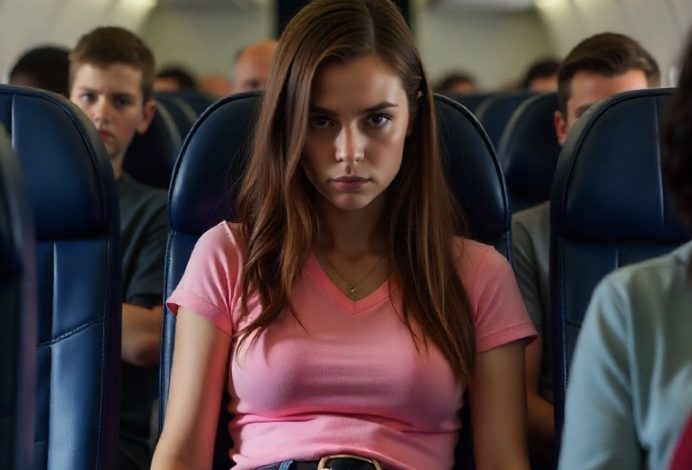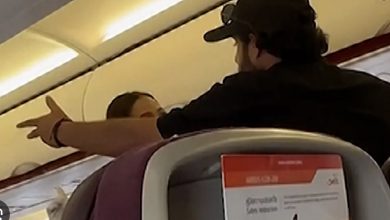“A Passenger’s Entitled Behavior Turned the Flight Sour, Until One Lesson Changed Everything”

When I boarded the plane that morning, I expected nothing more than a quiet, ordinary flight. The hum of the engines, the shuffle of passengers finding their seats, the low murmur of conversations—it all felt like the beginning of a smooth, uneventful journey.
I stowed my bag, settled into my seat, buckled my belt, and pulled out a book. For a few minutes, everything seemed calm. Then I noticed her.
She was sitting directly in front of me, and from the moment I saw her, I had a bad feeling. Her clothes were flashy, the kind of bright, eye-catching outfit you’d expect from someone filming content for social media. Her makeup was perfect, her jewelry sparkled, and her body language screamed entitlement. She looked like the sort of person who believed rules applied to everyone else—never to her.
And it didn’t take long for my instincts to be proven right.
The First Signs of Trouble
We had barely taken off when she slipped off her high-heeled shoes. Not just slipped them off politely, but tossed them carelessly under the seat in front of her. Then, she leaned back, stretched out, and spread herself as though the entire row belonged to her.
One bare foot landed on the empty seat beside her, toes wiggling casually as if she were lounging at home on her couch. The other foot stretched right out into the aisle.
At first, I thought, Well, that’s inconvenient. I figured she might shift soon, or maybe a flight attendant would ask her to move. But she didn’t. Minutes passed, and instead of pulling back, she sprawled even further, clearly comfortable in her selfish position.
And that’s when I realized it wasn’t just an inconvenience. It was a blockade.
The Aisle Became Impassable
Passengers soon began trying to make their way past. Some were heading to the restroom, others simply stretching their legs. But when they reached her row, they were forced to stop.
“Excuse me, could you please…” one man began politely.
She didn’t even let him finish. She shot him a glare so sharp it could have cut glass. Then, without a word, she shifted only slightly—just enough to pretend she had acknowledged him, but not enough to actually clear the aisle.
Another woman tried a different approach. “Sorry, I need to get by…”
The entitled passenger sighed loudly, rolled her eyes, and waved dismissively. “What, can’t you just go around?”
But “going around” was impossible. The narrow airplane aisle had no extra space. With her leg stretched out, she had effectively closed off the entire path. Anyone wanting to pass had to wait until she chose to move her foot.
And worse—it wasn’t just her arrogance. Then came the smell.
The Smell That Couldn’t Be Ignored
It hit suddenly, like walking into an invisible wall. A sour, sharp odor spread through the cabin, and it was impossible to ignore. I wrinkled my nose, certain at first that it had to be something else—maybe food from the galley, or a problem with the lavatory. But no. The source was clear.
Her bare foot, stretched into the aisle, carried the smell of sweat and neglect.
Across from me, a woman discreetly pulled her scarf over her nose, pretending it was because she was cold. Behind me, a little boy asked loudly, “Mom, why does it smell like someone hasn’t washed their socks in weeks?” His innocent honesty made several passengers stifle laughter, but most people were just disgusted.
I tried to ignore it. I told myself it wasn’t my problem. But with every passing minute, the tension grew. People were annoyed, uncomfortable, and yet no one was speaking up.
That’s when I decided enough was enough.
Pressing the Call Button
I reached up and pressed the call button. Within moments, a flight attendant appeared. She wore the professional smile that all flight attendants master, but her eyes carried a tired edge.
“Yes, sir, how can I help you?” she asked politely.
I spoke loud enough for the nearby rows to hear. “This passenger is blocking the aisle with her foot and refuses to move. If she’s going to keep using this space, maybe she should pay for it—since it’s basically her second seat.”
The flight attendant’s gaze shifted to the outstretched foot. Her smile faltered, replaced with the firm, neutral expression of someone about to enforce rules.
“Ma’am,” she said, turning to the woman, “you cannot block the aisle. It’s against safety regulations. Please move your foot back.”
Entitlement on Display
The woman scoffed, tossing her hair over her shoulder. “I’m not sitting in that seat,” she said sharply. “So I don’t have to pay for it. I’m entitled to certain privileges.”
Gasps of disbelief came from the passengers around her. You could feel the collective frustration in the air.
That was when her seatmate—a quiet man who had been silently suffering beside her the entire time—finally spoke. He leaned forward, his voice calm but firm.
“You can’t just take up someone else’s seat,” he said. “If you don’t want to pay for it, I’m happy to record this and file a formal complaint. I think the airline would be interested in how you’re treating both the staff and the passengers.”
The woman froze. The confidence drained from her face, replaced by panic.
The Crew Steps In
The flight attendant excused herself and returned moments later with the purser, the senior crew member in charge of the cabin. They spoke quietly to the woman, but I could clearly hear a few key words: “regulation,” “safety violation,” “inconveniencing passengers,” and—most satisfying of all—“current fee.”
When they walked away, the verdict was announced. If she insisted on using that extra space, she would be charged for it at the current in-flight rate. And as anyone who has flown knows, those rates are steep. Nearly as much as her original ticket.
Her face turned pale. Muttering under her breath, she finally yanked her legs back and sat like every other passenger on the plane.
The aisle was clear. The air felt lighter.
Applause from the Cabin
At first, there was silence. And then, from the back rows, a soft ripple of applause began. It wasn’t thunderous—it wasn’t the roaring cheer of a stadium. It was a quiet, satisfied round of clapping shared between strangers who had all been silently thinking the same thing: finally.
Even the flight attendants smiled, clearly relieved that the problem had been resolved without further conflict.
The woman across the aisle leaned toward me and whispered with a grateful smile, “Thank you. I was starting to lose my patience, too.”
For the rest of the flight, the atmosphere changed. People were relaxed again. The tension was gone. The aisle remained blissfully clear, and the air—without her bare foot stretched into it—felt noticeably fresher.
Reflections at 30,000 Feet
As I leaned back into my seat, I thought about what had just happened. It struck me how often people let entitlement slide because they’re too afraid of confrontation. Everyone around had been suffering silently, hoping someone else would step in.
And really, the entitled woman’s behavior was just one example of something bigger. There will always be people who believe rules don’t apply to them, people who take more than their share of space, comfort, or attention. But when nobody challenges them, they continue. They push boundaries until someone finally says: Enough.
In this case, all it took was one person pressing a button, speaking up, and refusing to let it slide.
Landing with a Lesson
When we finally landed, passengers gathered their belongings, chatting with each other in good spirits. I noticed how several of them gave me a small nod of acknowledgment as they passed. One older gentleman even said quietly, “Good job back there. You did what we were all thinking.”
The entitled woman, for her part, kept her head down. Her earlier arrogance had vanished. She left the plane quickly, avoiding eye contact with anyone.
As for me, I walked off the plane not just relieved to stretch my legs, but also satisfied. I hadn’t just cleared the aisle—I’d reminded everyone, including myself, that sometimes speaking up is the only way to make things right.
Final Thoughts
The flight could have been like any other—long, quiet, forgettable. Instead, it became a small but powerful reminder that respect and responsibility matter, no matter where you are.
She had tried to claim more than what she paid for. She had ignored the discomfort of others. But in the end, she learned that entitlement has consequences. And the cabin, united in shared frustration and eventual relief, gave its approval in the form of applause.
For the rest of the passengers, it was just one flight out of many. For me, it was a story about the value of speaking up, about the small victories that keep shared spaces livable.
And for her? Hopefully, it was a lesson she would remember the next time she thought about putting her bare foot where it didn’t belong.










